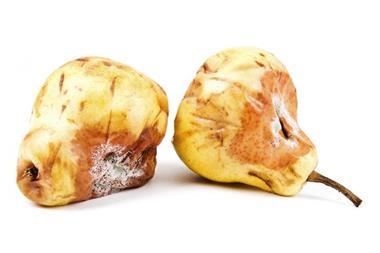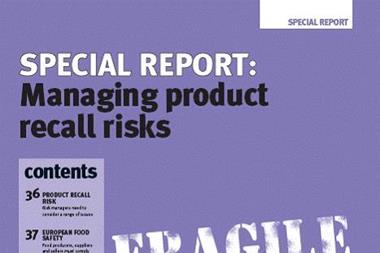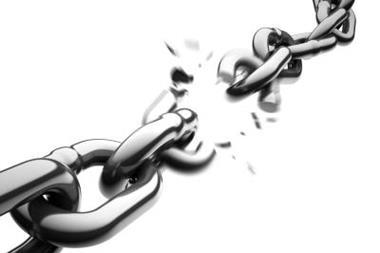Food producers should take all reasonable precautions and exercise due diligence
In November 1986 the disease bovine spongiform encephalopathy (or BSE for short) was first identified by the UK government’s central veterinary laboratory. The first case of the disease was found in a herd of West Sussex cattle. The farmer had contacted vets after he had found one of his cows behaving in an abnormal way.
By 1992 BSE cases peaked. Three cows in every 1,000 in Britain had the disease. A government committee considered the latest BSE research and concluded that the measures in place provided adequate safeguards for human and animal health. By 1994 this had been re-evaluated and the use of animal protein in animal feed was banned throughout the EU.
By 1995 the media reported the first case of the human variant of the disease Creutzfeld Jakobs disease (vCJD). Initially, UK government scientists rejected a connection between vCJD and BSE. Even so the government introduced tighter controls on farmers’ record keeping and prohibited the removal of brains, eyes and spinal cords in slaughterhouses. By March 1996 the government announced a probable link between BSE and vCJD. One week later the EU banned all exports of British beef.
European response
The BSE crisis highlighted commonplace lamentable practices in the production of British beef. The crisis also exposed regulatory failings at both national and European levels, partly due to significant differences in legislation between the member states. It also highlighted the difference in advice governments of different member states were receiving from their respective food science experts.
An urgent and unified response was called for and followed in the form of the European Regulation 178/2002. In force from 28 January 2005, the regulation laid down a unified law and general principles and requirements across the EU. It established the all important European Food Safety Authority (EFSA) and the rapid alert system (Articles 22, 23, 34 and 35).
The EFSA was established to provide scientific advice and technical support to the EU, to monitor the health and nutritional risk of foods and, via the rapid alert system, to notify the Commission and member states of information required to undertake risk analysis or product recalls.
The regulation laid down procedures in all matters of human food and animal production and safety, processing and distribution. Central to the regulatory requirements are the principles that:
• Consumers’ interests are paramount (Article 8), in particular to allow informed choices relating to food to be made
• No unsafe food may be placed on the market (Article 14). Food is deemed unsafe if it is injurious to health or unfit for human consumption.
• The origin of the food can always be traced (Article 18). All food, feed, food producing animals and any other substance intended or expected to be incorporated into food must be able to be traced through every stage of production, processing and distribution. Food and feed business operators must be able to identify any person they have supplied with or received food substances from.
The regulation also sets out the responsibilities of the food and feed business operators (Articles 19 and 20). If a food and/or feed business operator considers or has reason to believe that a food which it has imported, produced, processed, manufactured or distributed is not compliant with food safety requirements, it is required to immediately initiate the recall of the food in question from the market.
The regulation applies not only to food and feed business operators which produce food within the EU but also to those who import into and export from the EU.
Regulation saves lives
Late last year the effectiveness of the regulation was put to the test when we learned of melamine contamination in China. Melamine is a highly toxic chemical which was, apparently, routinely added by Chinese food manufacturers to food products to make them appear to have a higher protein content. In early September 2008 the world learned that 14 babies had fallen ill with contaminated baby milk. Within a few days this number had increased to 50,000 and shortlythereafter with the sad news of a number of deaths.
In early December 2008 there was a massive recall of Irish pork. Animal feed contaminated with carcinogenic dioxins were traced to nine pig farms in Northern Ireland and 10 in the Republic of Ireland. The recall affected 25 different countries.
“A recall, particularly a mishandled one, can even jeopardise the life of the business
In both instances the EU responded immediately and informed the appropriate government agencies. The affected food business operators within the EU were then notified early of the need to initiate an urgent recall of any affected product. Undoubtedly, the regulation proved to be effective.
In England the Food Safety Act 1990 was subsequently amended to sit side by side with the regulation. Like the regulation, the act aims to ensure that all food produced for sale in the UK is safe to eat, reaches quality expectations and is not misleadingly presented. It also provides legal powers and penalties. The act is enforced by central and local government. Environmental health officers have powers to enforce the act and supplementary legislation.
The main offences are:
• selling or possessing for sale food which does not comply with food safety requirements
• rendering food injurious to health
• selling food which is not of the nature or substance or quality demanded
• falsely or misleadingly describing or presenting food.
The principal defence under the act is the defence of ‘due diligence’. This defence is designed to balance the proper protection of the consumer against the rights of food producers not to be convicted of an offence when they have taken all reasonable precautions. This defence enables a food producer to be acquitted of an offence if they can prove that they ‘took all reasonable precautions and exercised all due diligence to avoid committing that offence’.
In the event that a food producer is found guilty of an offence under the act, magistrates courts can impose a fine of up to £20,000 (€22,000) per offence and a prison sentence of up to six months upon a culpable officer within the food producing company. In the event that sentencing is passed up to the Crown court, a guilty food producer can potentially receive a sentence of two years imprisonment and an unlimited fine.
Compliance
It is stating the obvious to say that food producers should take all reasonable precautions and exercise due diligence to avoid selling, possessing for sale or producing food which does not comply with safety requirements or is injurious to health. Equally, they should be careful to properly represent the food product to the consumer. In so doing the food producer will hopefully avoid the criminal penalties that exist and also hopefully avoid the need for a product recall.
Other considerations
Food producers should consider purchasing product contamination recall cover. The cost of a product recall can be very high for food producers and often can be caused by a third party through no fault of the producers. On a practical level a recall can take over the business and, in a worst case scenario, can signal the end of the product if it does not regain consumer confidence. A recall, particularly a mishandled one, can even jeopardise the life of the business.
Critically, keeping good records will make a recall easier. It is, after all, a requirement under the EU principle of product traceability.
Typically food producers that have decided to purchase specific recall cover for a contaminated product fare much better than those that do not. There is a good chance that the insured food producer will have received training to cope with the unique pressures of a recall as part of the services offered by the insurer. They might even have processes set in place in the event of such a crisis. After notification of a loss, they will have access to professionals that can advise upon the proper handling of a recall, the law, any possible third party claims and handling the media. Most important, they will have access to professionals which will ensure that the relaunched product stands the best chance of rehabilitation.
Insurers are also becoming more aware of utilising their rights of subrogation. If the need for the recall can be shown to have been caused by a third party - typically a third party that may have caused the contamination when they supplied a harmful ingredient – insurers may well be keen to recover their outlay from that third party (and, typically, their liability insurers). This has an all round positive affect for the insured food producer and the consumer. A successfully subrogated claim will also have the important effect of improving the claims history of the insured food producer. Equally, in holding the liable third party to task, any failings in quality control will undoubtedly have a financial consequential affect upon them, particularly if they are uninsured, or if they have an excess under their liability policy. They may also face the risk of higher premiums when they seek to renew cover. Such additional costs should focus the mind of an errant supplier.
Postscript
Christian Kelly is a partner in the law firm of Cozen O’Connor LLP. He advises insurers on first and third party claims concerning policies for product contamination recall cover



















No comments yet